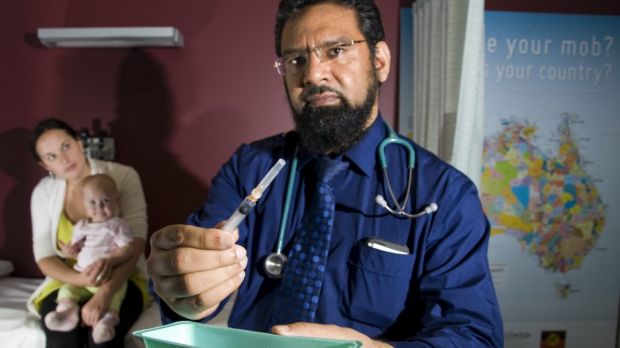
Dr Nadeem Siddiqui from Winnunga Nimmityjah Aboriginal Health Service. Photo: Elesa Kurtz
A “one-stop” health clinic for diabetes has led to better and more effective monitoring of patients with the condition, new research in Canberra has revealed.
Winnunga Nimmityjah Aboriginal Health Service has just released research, which has been published in the Australian Family Physician journal, which found those who visited a dedicated diabetes clinic were more likely to attend regularly, which contributed to more frequent and effective monitoring of their condition.
“They’re getting their blood tests done, they’re getting to see podiatrists for their foot checks, they get to see dietitians so there is lots of interventions that are happening for them and we were better able to monitor their blood pressure and so forth because we’ve been able to groom our clients to be regular attendees by the fact that it is a one-stop shop,” Dr Nadeem Siddiqui, executive director of clinical services, said.
The study involved a random sample of 65 Winnunga patients with type 2 diabetes and reviewed them over 12-months. It compared the effectiveness of the service’s dedicated diabetes to its GP clinic.
Aboriginal and Torres Strait Islander people are more than three times more likely than than non-Indigenous Australians to have diabetes and an excess of avoidable complications and diabetes.
The research found the Winnunga patients were about eight years younger than their non-Indigenous counterparts, much more likely to smoke, be overweight or obese and a higher proportion were on insulin.
Those who attended the diabetes clinic were more likely to meet targets for routine checks.
“If we want to really be able to monitor holistically patients who are diabetic and be successful at monitoring patients, then a one-stop is definitely the way to go and I think the theory would tell us that regular monitoring should convert into better health outcomes down the line, all other parameters being equal,” Dr Siddiqui said.
“Diabetes is a chronic condition and it impacts on different parts of the body so that regular monitoring is quite integral to be able to treat so if we haven’t monitored it, then there’s no way we can treat it.
“It’s a good way to tell us that yes for conditions that do need that regular monitoring, then having a dedicated holistic approach is probably the way to go.”
Winnunga has been running a diabetes clinic for 12 years.
Dr Siddiqui said the service ran weekly, monthly and quarterly clinics for diabetics.
